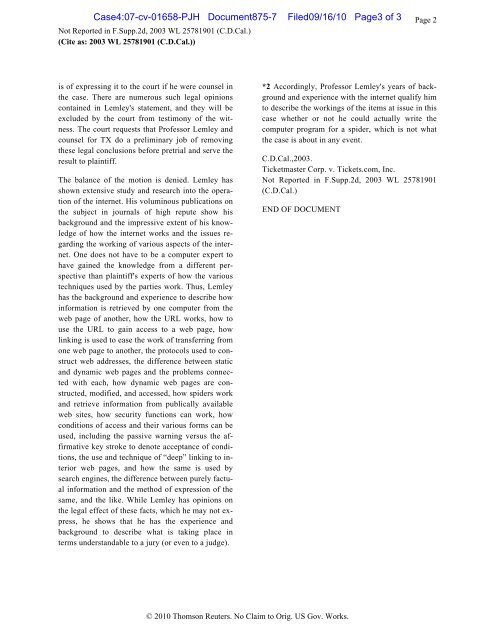exhibit 2 - SAP Lawsuit Portal
exhibit 2 - SAP Lawsuit Portal
exhibit 2 - SAP Lawsuit Portal
Create successful ePaper yourself
Turn your PDF publications into a flip-book with our unique Google optimized e-Paper software.
Case4:07-cv-01658-PJH Document875-7 Filed09/16/10 Page3 of 3<br />
Not Reported in F.Supp.2d, 2003 WL 25781901 (C.D.Cal.)<br />
(Cite as: 2003 WL 25781901 (C.D.Cal.))<br />
is of expressing it to the court if he were counsel in<br />
the case. There are numerous such legal opinions<br />
contained in Lemley's statement, and they will be<br />
excluded by the court from testimony of the witness.<br />
The court requests that Professor Lemley and<br />
counsel for TX do a preliminary job of removing<br />
these legal conclusions before pretrial and serve the<br />
result to plaintiff.<br />
The balance of the motion is denied. Lemley has<br />
shown extensive study and research into the operation<br />
of the internet. His voluminous publications on<br />
the subject in journals of high repute show his<br />
background and the impressive extent of his knowledge<br />
of how the internet works and the issues regarding<br />
the working of various aspects of the internet.<br />
One does not have to be a computer expert to<br />
have gained the knowledge from a different perspective<br />
than plaintiff's experts of how the various<br />
techniques used by the parties work. Thus, Lemley<br />
has the background and experience to describe how<br />
information is retrieved by one computer from the<br />
web page of another, how the URL works, how to<br />
use the URL to gain access to a web page, how<br />
linking is used to ease the work of transferring from<br />
one web page to another, the protocols used to construct<br />
web addresses, the difference between static<br />
and dynamic web pages and the problems connected<br />
with each, how dynamic web pages are constructed,<br />
modified, and accessed, how spiders work<br />
and retrieve information from publically available<br />
web sites, how security functions can work, how<br />
conditions of access and their various forms can be<br />
used, including the passive warning versus the affirmative<br />
key stroke to denote acceptance of conditions,<br />
the use and technique of “deep” linking to interior<br />
web pages, and how the same is used by<br />
search engines, the difference between purely factual<br />
information and the method of expression of the<br />
same, and the like. While Lemley has opinions on<br />
the legal effect of these facts, which he may not express,<br />
he shows that he has the experience and<br />
background to describe what is taking place in<br />
terms understandable to a jury (or even to a judge).<br />
*2 Accordingly, Professor Lemley's years of background<br />
and experience with the internet qualify him<br />
to describe the workings of the items at issue in this<br />
case whether or not he could actually write the<br />
computer program for a spider, which is not what<br />
the case is about in any event.<br />
C.D.Cal.,2003.<br />
Ticketmaster Corp. v. Tickets.com, Inc.<br />
Not Reported in F.Supp.2d, 2003 WL 25781901<br />
(C.D.Cal.)<br />
END OF DOCUMENT<br />
© 2010 Thomson Reuters. No Claim to Orig. US Gov. Works.<br />
Page 2


